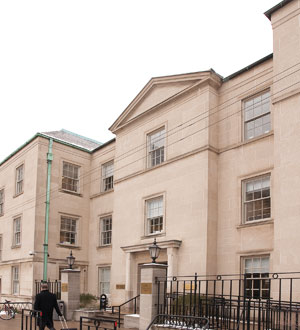In an era where the very survival of Ontario solicitors may be at stake, the solicitor as Law Society of Upper Canada bencher may be going the way of the dodo bird.

Among the 40 elected benchers at Convocation, only four — and just one from Toronto — are pure solicitors with a handful working as both barristers and solicitors.
“Overall, the current composition of Convocation is similar to what it was in 2003 and 2007, as shown in the 2009 governance task force report to Convocation,” said Susan Tonkin, a communications adviser at the law society, in an e-mail. “The report notes that while candidates and elected benchers come from a wide range of practice areas, barristers have consistently outnumbered solicitors more than five to one among elected benchers in the last four elections, even though solicitors represent 30 per cent of all lawyers.”
The upshot, says one bencher who spoke on condition of anonymity, is that solicitors’ issues don’t get a fair hearing.
“The barristers who are benchers are a great bunch,” says the bencher. “But when push comes to shove, small-firm solicitor issues get trampled by issues that are important to barristers.”
According to Alan Silverstein, a Thornhill, Ont., real estate practitioner who has been a bencher since 2003, his barrister colleagues are receptive to solicitors’ concerns.
“We’ve certainly had a voice,” he says. “The problem is when the barristers don’t understand the issue and don’t understand what’s being proposed, it takes a lot of time for so few solicitors to convince so many barristers of the need for certain measures.”
The question that arises, then, is whether a conclave where there are only four pure solicitors representing 15,000 solicitors who serve the public in a significant way fully reflects the public interest. By way of comparison, a constituency of some 4,500 paralegals has a statutory right to five elected representatives at Convocation.
“It is true that all benchers are there in the public interest, but Convocation benefits and makes better decisions when different aspects of legal service are more fairly represented,” says Bradley Wright, an Ottawa solicitor who’s a non-voting
ex officio bencher. “The barristers would never stand for a regulatory body making life-changing decisions about their practice environment — and rightly so — where nearly 90 per cent of the voters were non-barristers. Yet that is exactly what Ontario’s solicitors are facing.”
It’s a situation that could well become more acute. With the next bencher elections scheduled for 2015, some observers believe even fewer solicitors could prevail.
“Representation from solicitors at Convocation is very important and I do believe that solicitors’ issues are getting a fair hearing now,” says Susan Hare, a bencher from Manitoulin Island who does both barrister and solicitor work. “But if the numbers ever change so that there are even fewer solicitors, we could have a very different situation.”
According to Silverstein, the increasing workload involved in being a bencher could dissuade potential solicitor candidates. “We are trying to get more solicitors to run, but the workload for benchers is going up and can amount to as much as two days per week,” he says. “Many solicitors, most of whom practise in small firms or are sole practitioners, say they can’t afford that kind of time. It’s a problem that’s going to get worse as the issues become more and more complex.”
As well, standing for election is one thing; winning is another.
“There are many candidates for bencher and generally speaking, it’s harder for solicitors to become known to voters than it is for barristers, especially in some areas of the province,” says solicitor and Bencher Robert Evans of Evans & Evans in Bradford, Ont. “It would be helpful, however, to have more solicitors in Convocation.”
Aggravating the situation is the fact that so many of the issues facing Convocation have significant repercussions for solicitors. Title insurance is perhaps the most obvious historical example and solicitors didn’t come out well on that issue.
“Title insurance certainly lost us a fair chunk of business,” says Silverstein. “And right now, the greatest issue facing the solicitor bar is survival in the face of pressure to do more with less, the changing Rules of Professional Conduct, the rising costs, and the lower fees.”
Arguably, the most controversial issue currently facing Convocation relates to the viability and possible shape of alternative business structures in Ontario. Perhaps the strongest argument in favour of alternative business structures is the promotion of access to justice. The irony is that while the advent of new structures likely threatens small-firm solicitors far more than barristers generally, it’s difficult to make the argument that solicitors represent the greatest threat to access to justice given the time and cost of resolving litigation disputes or obtaining representation in family or criminal matters.
“All the barriers to access to justice in terms of solicitors’ work is the height of mown grass,” says one bencher. “But even though the barriers relate to litigation, a barrister-dominated Convocation thinks it’s better to encourage Walmart wills than to encourage litigation processes that reduce file turnover time from three months to six years, which is where they should be.”
Silverstein is of similar mind. “The people who are complaining about access are not complaining about solicitors,” he notes.
There does seem to be a move afoot to give solicitors’ issues a higher profile. In April, acting on a recommendation from the Ottawa real estate bar last summer, the law society announced the formation of a real estate liaison group with a first meeting scheduled for May 7.
“It’s an interesting new wrinkle, but we’ll have to see how it goes,” says Silverstein.
It may not be an easy go: a similar effort failed a few years ago amid reports of considerable infighting.
“We just weren’t going anywhere,” says Silverstein. “The group just became a soapbox for a couple of people.”

